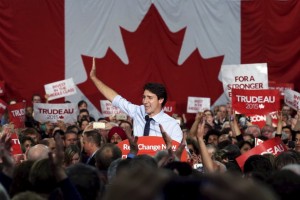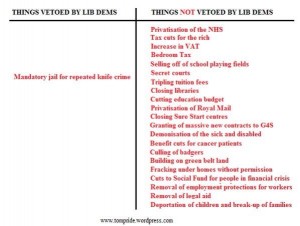Following Scotland’s ‘No’, and the promise of constitutional reform, it seems that everyone is (again) agonising over the “West Lothian Question“, or (in short) how to give England fair treatment in a devolved UK.
More specifically, the question asks: should non-English MPs vote on purely English affairs in the Westminster Parliament?
Look, either I’m missing something obvious here, or the entire British commentariat are idiots. I’m not saying the former is impossible, but, well…
The United Kingdom’s national parliament – the House of Commons and the House of Lords – should vote on matters which are national competence. ALL parliamentarians, from ALL parts of the UK, should have equal treatment in a national parliament. Surely this is obvious?
If a matter is England-only, then why is it being dealt with by the UK’s national parliament? Scotland-only issues are not dealt with by the UK’s national parliament, they are dealt with by the Scottish Parliament. Wales-only issues by the Welsh Assembly. And so on.
Why on Earth would the UK’s national parliament in Westminster feel it is the right body to rule on issues which relate only to one region of the UK? Especially since we already HAVE a devolved system of regional government in the UK!
I think there are a couple of things going on here. They are linked, and in some respects overlapping.
One is our first-past-the-post system of constituency MPs who represent a specific geographical area, as well as a party. This is a strange system, full of contradictions and conflicts of interest, but I won’t go into them here, except to suggest that our MPs seem to believe that their links to constituencies give them legitimacy (in some cases SOLE legitimacy) as the democratic representatives of those constituencies for local as well as national (and European!) issues. This is toxic for local and regional (but also European) democracy.
I think the other issue here is English exceptionalism, and specifically Westminster’s blindspot when it comes to the value of other tiers of government. I’ve discussed this elsewhere. In Britain, especially in England, we are brainwashed from an early age to think that the national tier of government, from Westminster, is the only truly legitimate kind. One hears this all the time in the dismissive way our national politicians speak of the European Parliament; but it’s just as obvious when you look at the struggle our regions have faced to establish devolved local democracy. (Local democracy in modern Britain is in a sorry state.)
Every argument I have with anti-EU types always runs into the same brick wall: ‘but there’s no such things as a European demos!’ This is exactly the kind of thinking that sees the West Lothian Question as a conundrum up there with Fermat’s Last Theorem or peace in the Middle East. It’s muddle-headed, messy thinking, because it’s based on emotion and false assumptions, namely the notion that there is something exceptional about UK (and more especially English, specifically Westminster) democracy which makes other tiers of government – local, regional, European – less legitimate. (And ‘less legitimate’ easily elides into ‘illegitimate’ when you have a black and white UKIP view of the world.)
Clearly, such thinking can never deliver a just and functional federal form of government; though, as we so hate the ‘f’ word in Britain, let’s call it ‘devo-max’ – what the Germans might call ‘subsidiarity‘.
Yes, the Germans. Look at their federation. It works. Happily for the Germans their country has never been dominated by one region in the way that the UK has, and is. So it would never have occurred to modern Germany’s post-war founders to establish a federated democracy where a given region, say Bavaria, has a regional parliament (Landtag) but Nordrhein-Westfalen, where Bonn is situated, is governed directly by the national parliament (Bundestag). And where Bavarian members of the Bundestag are not allowed to vote on certain issues because they affect only Nordrhein-Westfalen. No, the federal parliament governs the federal state, and it would be unthinkable to exclude the democratically-elected representatives of any part of that state from its decision-making process.
If we’re going to have devolved power in the UK, then it stands to reason that England must have its own devolved legislature just as the other regions do. Any other solution would be incredibly unjust, but also deeply irrational. It’s time for the UK to look again at the principle of subsidiarity – decisions should be taken at the appropriate level of government, as close as possible to the citizen; and each level (tier) of government should have strictly-defined, non-overlapping areas of competence. So there should be no question of the national parliament treating local, or regional issues; and the West Lothian Question simply does not arise.















